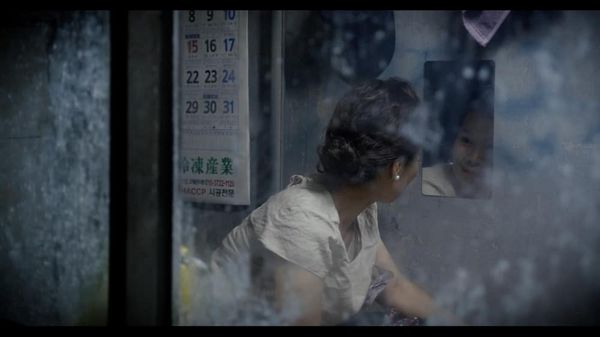Eye For Film >> Movies >> Gull (2020) Film Review
Gull
Reviewed by: Jennie Kermode

Violence against women is an issue that has long been neglected in Korean society, thanks in part to a traditional way of life which supposed that women would always be at home or otherwise under the protection of men they could trust. As recent films like Lee Kwon's Door Lock have shown, however, cultural attitudes are changing. Women are increasingly speaking up about their experiences and filmmakers are playing their part.
Kim Mi-jo's Gull is not a film about rape itself. Viewers who have gone through trauma themselves can watch it without having to deal with a reconstruction. Instead, its focus is on the aftermath. It also distinguishes itself by telling the story of an older woman, which is rare in cinema anywhere in the world. O-bok (Jeong Aehwa) is not the sort of person that popular narratives tell us is vulnerable, yet although police statistics suggest that risk reduces with age, a significant number of older women are subjected to crimes of this type every year. Kim's film is a reminder of their existence and their need for justice.
O-bok is a practical, family-focused woman whose main concern, when we first meet her, is her daughter's impending wedding. The opening scene sees a key meeting between prospective in-laws, emphasising the importance of social respectability and of communicating a particular kind of femininity. The potential groom is considered first and foremost in terms of his financial prospects, the potential bride in terms of her ability to look pretty, smile and present herself as a helpmate. O-bok herself, lacking an education, has worked all her life in the local fish market, and it's there, when she's drinking in celebration of the betrothal, that the unseen incident occurs. To make it worse, her assailant is the chairman of the redevelopment committee an influential figure who, in straitened times, everyone there is depending on.
Nobody knows how to respond when that sort of thing happens to them. O-bok goes through the motions, cleaning herself up, visiting a local hospital to deal with her physical injuries. At home, her husband and daughter assume that her unhappy state is the product of a hangover, but as time goes by and she remains withdrawn, her daughter realises that something more serious is amiss. Inconvenient though it is, and horrible to have to deal with, the truth of what has happened leaks out - only to precipitate a different set of horrors as O-bok is forced to confront myths, prejudice and general anger at how inconvenient she has become - some of it very close to home.
Shooting from odd angles, watching from above or tilting her camera up from below, Kim conveys both the crowded milieu within which her heroine lives and the sense of dislocation that the rape creates. Some scenes begin with an empty street and we hear the action before we see it. We don't look O-bok directly in the eye until the very last shot. Why, then, should we be moved by her in a way that the other characters observing her are not? This comes down to Jeong's performance and to the small ways in which the script makes us privy not just to how this incident has affected her but to the weight of other injustices she has had to survive across the course of her life. Kim makes us aware of her strength by revealing her powers of endurance even as the man who harmed her is feted as strong for doing little more than shout about worker oppression and his commitment to human rights.
Though a little overdone in places, Gull is an important contribution to contemporary Korean cinema and makes its points well. An award winner at the 2020 Jeonju Film Festival and part of the London Korean Film Festival line-up, it's also significant as the début of one of the country's few female directors, and it emphasises how much their voices are needed.
Reviewed on: 09 Nov 2020















